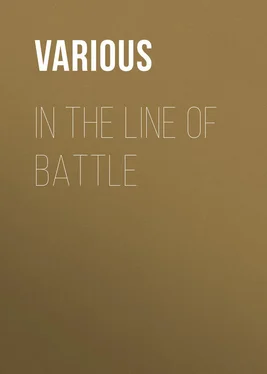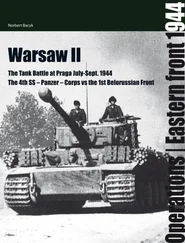Various - In the Line of Battle
Здесь есть возможность читать онлайн «Various - In the Line of Battle» — ознакомительный отрывок электронной книги совершенно бесплатно, а после прочтения отрывка купить полную версию. В некоторых случаях можно слушать аудио, скачать через торрент в формате fb2 и присутствует краткое содержание. Жанр: История, prose_military, Биографии и Мемуары, на английском языке. Описание произведения, (предисловие) а так же отзывы посетителей доступны на портале библиотеки ЛибКат.
- Название:In the Line of Battle
- Автор:
- Жанр:
- Год:неизвестен
- ISBN:нет данных
- Рейтинг книги:4 / 5. Голосов: 1
-
Избранное:Добавить в избранное
- Отзывы:
-
Ваша оценка:
- 80
- 1
- 2
- 3
- 4
- 5
In the Line of Battle: краткое содержание, описание и аннотация
Предлагаем к чтению аннотацию, описание, краткое содержание или предисловие (зависит от того, что написал сам автор книги «In the Line of Battle»). Если вы не нашли необходимую информацию о книге — напишите в комментариях, мы постараемся отыскать её.
In the Line of Battle — читать онлайн ознакомительный отрывок
Ниже представлен текст книги, разбитый по страницам. Система сохранения места последней прочитанной страницы, позволяет с удобством читать онлайн бесплатно книгу «In the Line of Battle», без необходимости каждый раз заново искать на чём Вы остановились. Поставьте закладку, и сможете в любой момент перейти на страницу, на которой закончили чтение.
Интервал:
Закладка:
Constant attempts were made to escape, and I fancy that some of the prisoners gave up the whole of their time to plotting and planning ways of clearing out. The chance of getting away was small, because at night the camp, buildings as well as compounds, was brilliantly lighted by big electric arc lamps, and there were sentries and barbed wire entanglements everywhere. But in spite of all precautions several Belgians and a few Englishmen and Frenchmen escaped, and we were immensely pleased when we heard that one Belgian had got away by stealing the commandant’s motor-car and bolting in it. I did not hear what became of him.
Brutal punishments were inflicted for the most trivial offences, such as smoking in forbidden places, and a common method was to tie a prisoner to a post, with his feet deep in snow, and leave him there for two hours, with an armed sentry over him. The poor wretch dare not move, if he did the brave warrior with the gun kicked him – the German is a fine hand at hitting when the other chap can’t hit back. This savage cruelty had a terrible effect on some of the victims, and helped to make them the life-long wrecks that they now are.
From Münster I was sent to Brussels for exchange. We were quartered in the Royal Academy, and naturally enough the Belgian women and children tried to give us things. When this was seen, the German wounded who were in the building were ordered to turn the hose on, and they did. It was a great laugh, though, for it took them four hours to fix the hose – and then it would not work properly.
The authorities suddenly decided that I should not be exchanged, because I was a non-commissioned officer, and I was sent to Wesel on the Rhine, where I stayed six weeks. I had to go into hospital again, because my wound would not heal – it never got a sporting chance. Ill treatment continued, and for reasons, mostly revenge, which Britishers would scorn. The chief of this hospital was an old man whose only son had been lost in a submarine that had been sunk by the British. I saw that something was wrong as soon as he appeared in the morning, and I felt that we should get it hot, though I did not know how.
The old doctor had all the English prisoners sent for, and incredible as it may seem, every wound that was healed was deliberately reopened and plugged, while wounds that were not healed were probed inside and all the newly-formed flesh was destroyed. Many of us suffered terribly for a long time as the result of the visit to us of the old man who had lost his son in fair fight.
My wound was finally healed on July 25th, exactly nine months from the day on which my arm was taken off.
My sole object now was to get away from the horrible country and the more horrible people, and, thank God, I managed to do it. The refusal to exchange me was a bitter blow, but I soon pulled up and set to work to get away. Accordingly, when I reached Wesel, I reported myself as a private, and I was reckoned as a private and put in the list for exchange. I was sent to Aix-la-Chapelle.
Soon after this I came away with other prisoners of war, and one of the most glorious moments of my life was when I set eyes again on Old England.
There is one strange incident that I have kept to the last.
I have said that when I was shot on outpost I was stripped. My jacket must have been thrown aside, for next day a chum of mine picked it up and put it in his pack, thinking I had been killed, and meaning to bring it home, if he lived, as a relic. During many a long day and hard fight he carried that extra burden in his pack – no little thing to do – then he himself was wounded and sent home. He brought my jacket with him, and now I have it, and shall always treasure it as a memento of my war-days. The jacket is smothered in blood.
There are about 28,000 Britishers still in Germany, suffering as I suffered – some worse. They want releasing. The only way to release them is to end the war, and the only way to end the war is the cooperation of every man and woman, old and young, rich and poor, working for one object – Victory.
CHAPTER III
GASSED NEAR HILL 60
[When the Germans plunged the civilised world into this appalling war, one of their big hopes was that the sons of the Motherland would desert her in the hour of her greatest need. Never was a greater miscalculation made, even in a war which has become notorious for enemy miscalculations, for her Colonies rallied round Great Britain in a manner that has covered them with lasting glory. A particularly splendid contingent hurried over from Canada to our shores, and went into the most severe training, lasting through an uncommonly bad winter. In due course it left England, and entered almost at once into some of the hardest and most deadly fighting of the whole campaign – the conflict at the village of St. Julien, in the region of the famous Hill 60, where many troops fell gloriously in repelling the attempts of the Germans to hack their way through to Calais. In their determination to succeed, the Germans deliberately adopted the devilish device of poison-gas. How even that cowardly expedient failed is told in this story by Lance-Corporal R. G. Simmins, of the 8th Battalion Canadian Infantry, 90th Winnipeg Rifles.]
When I recall my experiences at the front, I am particularly struck by the circumstance that the thing which stands out most clearly in my mind is not the actual campaigning, not the long and weary times in the trenches, not even artillery, rifle, or bayonet work, but the coming of the poison-gas. I myself was gassed in the furious fighting at St. Julien.
I will get right at things quickly. Towards the end of April the Canadian Division was holding a line near Ypres, which was not far short of three miles in extent. That line ran north-west from Poelcapelle-Paschendaile Road, and at the end joined up with the French. Three infantry brigades with artillery comprised the division, the first being in reserve, the second on the right of the third, and the third connecting with the French.
We were in the salient of Ypres which was known to be weak, but the holding of which was of vast importance. I am proud to think that I am one of the Canadian Contingent to whom the big task of keeping back the German hosts at that point was given, and that I fought with men who gave their lives in stopping the German attempt to hack a way through to Calais, so as to have a very near blow at England. Placed as we were placed, it was possible to see the battle being fought on three sides, and this was uncommonly interesting.
We were, of course, in trenches, quite near the Germans, but between us there ran a ridge which is known as a hogback, so that there was a somewhat formidable natural barrier between the opposing forces. We were so near to the famous Hill 60 that we heard the explosion there and the subsequent battle when we were in billets at Ypres. The hill had been mined with six or seven tons of dynamite, the explosion of which was enough to change even the appearance of the hill.
There was a fine smart affair on the night of April 17th, when about a mile of German trenches was taken, and I saw about 2000 German prisoners being escorted away. Their uniforms were shabby, and their equipment was not what it ought to have been, but the men themselves appeared to be remarkably fit and well cared for.
We had gone into the trenches after marching through Ypres, where the chimney-pots were tumbling about our ears, and we were expecting very hot times; but the hogback prevented us from seeing the Germans, and of course kept us out of their sight. But there were German snipers everywhere, and they took good care to harass us.
I had charge of a section of bomb-throwers, and we did our best to hurl these strange but quite legitimate weapons at the enemy. At first the bombs were homely contrivances, made of jam-tins filled with explosives; but later they were made under War Office control, and were far superior to the primitive articles which we manufactured ourselves.
Читать дальшеИнтервал:
Закладка:
Похожие книги на «In the Line of Battle»
Представляем Вашему вниманию похожие книги на «In the Line of Battle» списком для выбора. Мы отобрали схожую по названию и смыслу литературу в надежде предоставить читателям больше вариантов отыскать новые, интересные, ещё непрочитанные произведения.
Обсуждение, отзывы о книге «In the Line of Battle» и просто собственные мнения читателей. Оставьте ваши комментарии, напишите, что Вы думаете о произведении, его смысле или главных героях. Укажите что конкретно понравилось, а что нет, и почему Вы так считаете.












